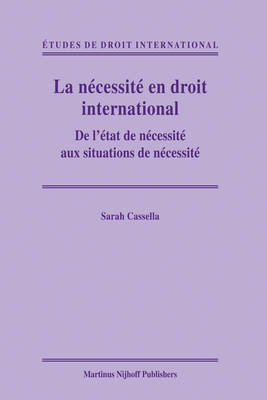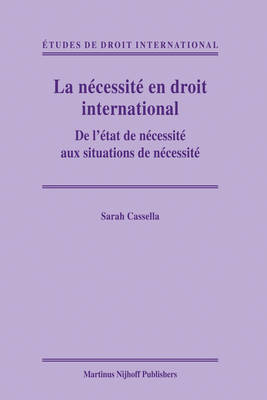
- Afhalen na 1 uur in een winkel met voorraad
- Gratis thuislevering in België vanaf € 30
- Ruim aanbod met 7 miljoen producten
- Afhalen na 1 uur in een winkel met voorraad
- Gratis thuislevering in België vanaf € 30
- Ruim aanbod met 7 miljoen producten
Zoeken
Omschrijving
La Commission du droit international, après avoir longuement hésité, a inscrit l'état de nécessité dans sa codification de la responsabilité des États en tant que circonstance excluant l'illicéité. L'objet de cette étude est de démontrer qu'il s'agit d'un mécanisme beaucoup plus diffus et fondamental du droit international, intimement lié à ses caractéristiques propres. Il a comme fonction la limitation des obligations substantielles des États lors de la survenance d'un fait-condition - la situation de nécessité - afin d'éviter que l'application du droit ne génère un coût social excessif. Sa réalisation requiert toujours une pondération des intérêts en conflit. Seulement lorsqu'un coût social excessif ne peut être évité, l'état de nécessité intervient dans le cadre des obligations secondaires de la responsabilité internationale, en tant que circonstance atténuante.
After much hesitation, the International Law Commission codified the state of necessity as a circumstance precluding wrongfulness in the field of State responsibility. This study aims to demonstrate that it is a much wider mechanism, essential to international law and strictly connected to its own characteristics. It performs the function of limiting the substantial obligations of States in case of the realization of a fact condition - a situation of necessity - in order to avert an excessive social cost, born out of law implementation. It always works through a balance of conflicting interests. Only when a social cost cannot be avoided, the state of necessity, under the features of a mitigating circumstance, enters the field of secondary obligations relating to international responsibility.
After much hesitation, the International Law Commission codified the state of necessity as a circumstance precluding wrongfulness in the field of State responsibility. This study aims to demonstrate that it is a much wider mechanism, essential to international law and strictly connected to its own characteristics. It performs the function of limiting the substantial obligations of States in case of the realization of a fact condition - a situation of necessity - in order to avert an excessive social cost, born out of law implementation. It always works through a balance of conflicting interests. Only when a social cost cannot be avoided, the state of necessity, under the features of a mitigating circumstance, enters the field of secondary obligations relating to international responsibility.
Specificaties
Betrokkenen
- Auteur(s):
- Uitgeverij:
Inhoud
- Aantal bladzijden:
- 592
- Taal:
- Engels
- Reeks:
- Reeksnummer:
- nr. 5
Eigenschappen
- Productcode (EAN):
- 9789004209961
- Verschijningsdatum:
- 6/05/2011
- Uitvoering:
- Hardcover
- Formaat:
- Genaaid
- Afmetingen:
- 157 mm x 236 mm
- Gewicht:
- 1043 g

Alleen bij Standaard Boekhandel
+ 815 punten op je klantenkaart van Standaard Boekhandel
Beoordelingen
We publiceren alleen reviews die voldoen aan de voorwaarden voor reviews. Bekijk onze voorwaarden voor reviews.








